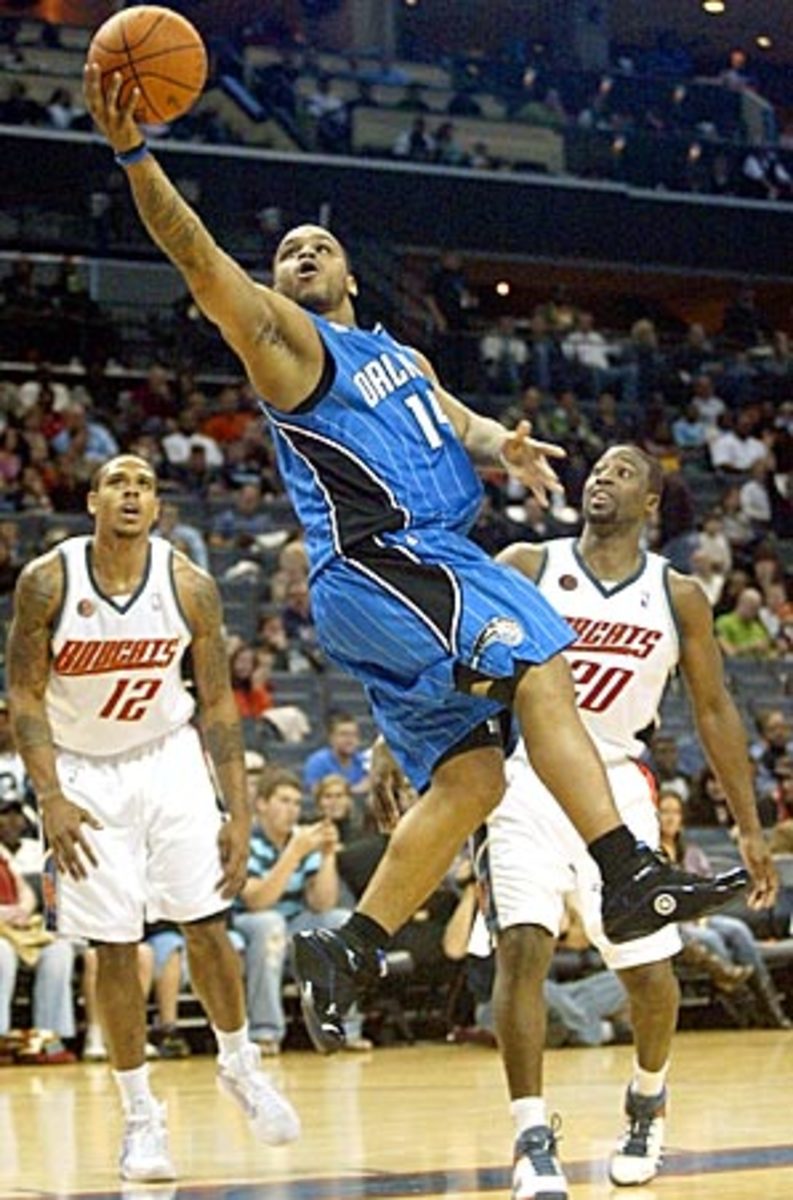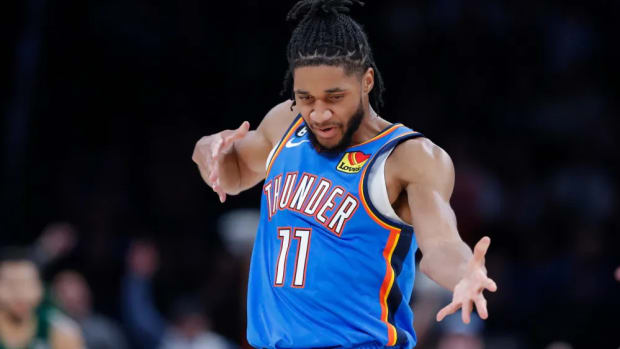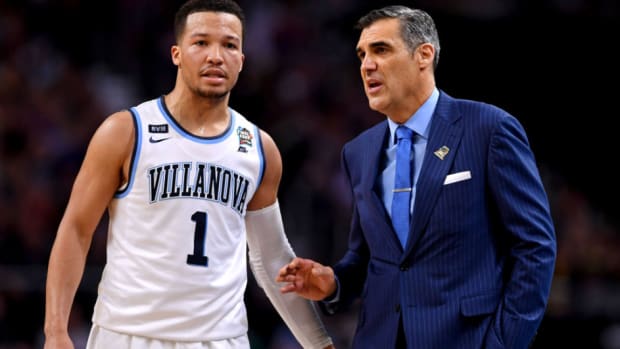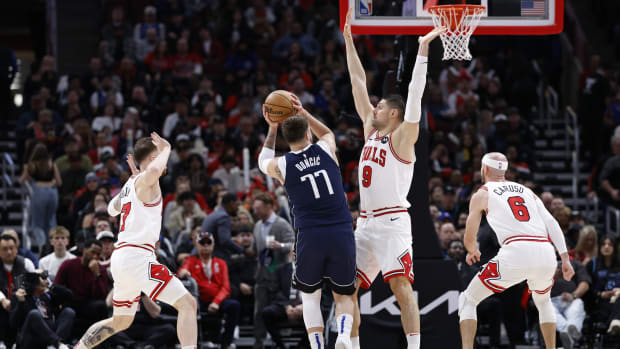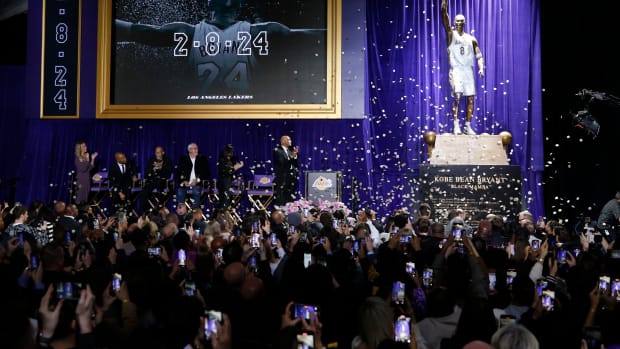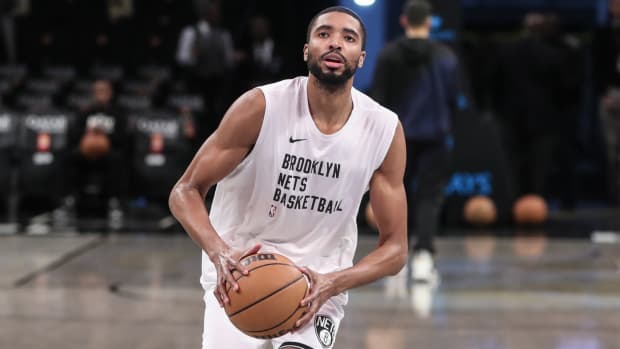Roundtable: Believe in Magic?
1. What do you make of the Magic's 24-7 start?
Ian Thomsen: I wonder how far they can go in the playoffs. Is Dwight Howard ready at 23 to lead his young team to a best-of-seven win over the defending champion Celtics or the Cavaliers, who themselves have reached an NBA Finals and won five playoff series in the last three years? Those two contenders look like finished products, while the Magic are trying to reach that level. Unless they make some trades, the only way they'll get there is for Howard, point guard Jameer Nelson and the rest of them to learn the hard way in the postseason, just like every young team in the league has had to do it.
Jack McCallum: I was ignoring it for a while. Last season, the Magic got out of the gate fast and I did a story on them for Sports Illustrated, after which they came back to earth a little. But they're a better team this year with an improved Dwight Howard and Jameer Nelson, a steady Hedo Turkoglu and Rashard Lewis (I've never been a big fan of the latter), a deep rotation that sometimes reaches all the way down to J.J. Redick, good fortune on injuries (so far) and the sure hand of Stan Van Gundy on the throttle. However, what that makes them, still, is the third-best team in the East.
Chris Mannix: The Magic are no fluke. They are as good on the road (11-4) as they are at home (13-3), and they've won 14 of 18 games against the Western Conference. Two big factors for them: First, Tony Battie's return to the lineup after missing all of last season with a shoulder injury has added a legitimate inside presence to play next to Dwight Howard. Battie's numbers aren't gaudy (4.9 points, 4.3 rebounds in 16.5 minutes) but he's a legitimate power player in a lineup nearly devoid of them. And second, Jameer Nelson is fast developing into one of the league's top point guards. The jury will continue to be out on Nelson until he succeeds in the playoffs, but his start (16.7 points, 52.4 percent shooting from the field) has been impressive.
Steve Aschburner: Heading into this season, I was skeptical of Orlando's backcourt and not convinced that Hedo Turkoglu and Rashard Lewis would give Dwight Howard enough help inside. But a few things are bringing me around to the Magic, not the least of which is their success against the West. Then there is their road record. And Jameer Nelson's performance. And Orlando's improved defensive numbers (third in defensive efficiency, third in opponents' field-goal shooting). And the way Howard will come out for warm-ups in a tank top, his Muscle Beach physique figuratively kicking sand in the faces of the other teams' scrawny men. OK, that's going too far. But Nelson's play and the Magic's ratcheting up on defense make them, well, a solid third-best in the East. But with a shot at No. 2.
***
2. In a recent Roundtable, everybody agreed that the Western Conference has a nine-team playoff race and that six teams -- the Grizzlies, Clippers, Warriors, Kings, Timberwolves and Thunder -- have no chance of reaching the postseason. Of those six teams, whose future are you buying?
Ian Thomsen: The first question is, Which of them has the best young player? In that sense, you look at Oklahoma City's upside with Kevin Durant, based on what he's done at 20 with very little help around him.
Some of these teams have different agendas. The Clippers are built to win now, and the Grizzlies may lack the resources and commitment to exploit the cap space and flexibility they've amassed. The Warriors seem to rebuild anew with young players every three or four years, so their track record isn't promising even if Monta Ellis recovers from his ankle injury.
The Timberwolves, Kings and Thunder all have a few intriguing pieces to build around, but how do you convert young teams playing as badly as they are into winning organizations? It's going to come down to making some shrewd trades and surrounding young talents like Durant, Minnesota's Al Jefferson and Sacramento's Spencer Hawes with players who can help them turn the corner sooner than later. Those revamps are impossible to predict: Did anybody forecast the Celtics' summer of 2007? They looked like a hopeless team with a star player in Paul Pierce who had little faith. Based on the Celtics' model, then, these losing teams are going to need owners who are willing to pay the price of a talented team, and general managers who are wise and bold.
In short, I don't have a clue which of these teams is going to make it, because if any of them ever does turn into a winner, it will be with an overhauled roster that looks nothing like what we're seeing today.
Jack McCallum: Since I can't answer none of them, I'm going to say the Grizzlies. They have a budding star in O.J. Mayo, two fine young players in Rudy Gay and Marc Gasol and a coach, Marc Iavaroni, who won't stop working until he gets it right.
Chris Mannix: Memphis. The Grizzlies are well under the salary cap and have an enviable nucleus (O.J. Mayo, Rudy Gay and Marc Gasol) to build around. It's unclear whether GM Chris Wallace and coach Marc Iavaroni will survive until next season, but even if they don't, it's clear to me that Memphis has a team that's headed in the right direction. Wallace (or his replacement) will need to be a good salesman, because regardless of the talent level, it will take a hard sell to persuade a marquee free agent to make small-market Memphis his new home.
Steve Aschburner: No offense, but I'd like to park my cash in something safer, like a certificate of deposit. Or a piece of the Trail Blazers. Forced to buy, I would go with the Grizzlies. In O.J. Mayo and Rudy Gay, they have two wing players capable of combining for 45 points for the next 10 years. Marc Gasol looks like a bulkier version of his brother, which could be a really good thing, and Hakim Warrick and Darrell Arthur are good young pieces up front. In Mike Conley and Kyle Lowry, Memphis has a two-headed point guard that, in a combined 48.8 minutes, is contributing 15.7 points, 7.5 assists and 5.4 rebounds. This is a team that routinely uses a starting lineup younger than the University of Memphis team that played for the NCAA championship last spring, and we all know that the best thing about young players is that they get older.
3. What did you take away from the Lakers' victory against the Celtics in Los Angeles on Christmas Day?
Ian Thomsen: The Celtics' defense wasn't nearly as sharp as we saw during the 2008 NBA Finals, or what we should see in the playoffs ahead. More ominous was the Celtics' difficulty to finish around the basket. They missed a lot of bank shots from close range. Maybe it was just a bad day, or maybe it had something to do with the fact that the Lakers are the taller team around their 7-foot front line of Andrew Bynum and Pau Gasol. And against contenders like the Lakers, Cavaliers and Spurs, the Celtics need to add another lengthy defender to make up for the losses of P.J. Brown and James Posey, who played big defensively.
But don't read too much into the outcome. I remember in the 1980s, when the Celtics and Lakers met three times during the Finals, their regular-season games provided no advantage to either side.
Jack McCallum: What I took away is that the Celtics, no matter their record, are not a super team, a la the Chicago Bulls of the mid-1990s. They are a very, very good team and a better-than-even bet to repeat as NBA champions. But a super team would've made a supreme statement and won that marquee game on the opponent's court.
Chris Mannix: Why was Boston playing in L.A. on Christmas Day? Shouldn't the NBA's runner-up have to travel to the champions' backyard for such a high-profile matchup? Whatever happened to "to-the-victor-goes-the-spoils?" As for on the court ... not much. The Lakers were one historic Boston comeback from sweeping three games from the Celtics in L.A. during last season's Finals, so it's hardly newsworthy that they won last week's game. But watching the Celtics' Tony Allen heave shots at the rim makes me continue to question how much of a liability he will be in the playoffs, when jump shooting is at a premium.
Steve Aschburner: It was a nice gut-check game for both teams, serving notice that a potential Finals matchup could be much more intense than the six-gamer (with finale blowout) we got last June. It didn't prove what L.A. might have done back then had Andrew Bynum been healthy, but it does heighten the intrigue for next time. Pau Gasol was freed up (especially late) by Bynum's presence to be an offensive sidekick to Kobe Bryant. Boston's loss of James Posey and the Lakers' gain of a healthy Trevor Ariza is a real gap-closer, too. Still, let's remember that the Celtics were on the road, on the opposite coast, on Christmas, playing poorly, yet still had a lead in the closing minutes.
***
4. If you were commissioner David Stern, what would be your New Year's resolution for the NBA?
Ian Thomsen: I would devote the year to working behind the scenes with the goal of avoiding an extended lockout after the current collective bargaining agreement expires in 2011. The owners will want to leverage the recession into shorter contracts and other limits on player income. But the larger goal should be to enact reform without hurting the momentum the league is building in this era of the resurgent Celtics, Kobe Bryant's Lakers and the emergence of LeBron James's Cavaliers as a genuine contender. To grow its business, the league needs to make its players more popular, rather than vilify them in a divisive lockout argument over how to split up billions of dollars -- while the real world is struggling with two wars, growing unemployment and historic deficit spending. The league has enough problems without giving fans another reason to turn off the NBA, and I am certain Stern is already trying to explore middle ground to avoid a damaging work stoppage.
Jack McCallum: To be the first league in the history of the world to reduce or at least hold the line on ticket prices. To go on an all-out campaign that says, We're trying to return this game to the little people. The NBA takes so many unwarranted shots that it needs to make a bold move that no one could find fault with. Yeah, I know, I'm not an owner who has to balance his books. But with sinking attendance and lean economic times, this would be a move that will pay off in the long run.
Chris Mannix: I'm holding a conference call with my referees today and openly encouraging them to keep their whistles in their pockets when there is a collision around the rim. A charge should only be called when a hustling defender stays with his opponent step-for-step and forces the offensive player to bowl him over to get to the rim. A charge is not a 6-10 shot-blocker rushing to a spot on the floor, covering up his family jewels and forcing contact. That's not defense; that's bad basketball. How much better would the game be if offensive players played with the knowledge that they are not going to get whistled for bumping into a stationary player? To me, this would not be a slight improvement in the game -- it would be a significant one.
Steve Aschburner: I would instruct all NBA teams to court the average fans -- the working-class folks and, unfortunately these days, the unemployed-class folks -- as fervently as they did coming out of the lockout 10 years ago. Back then, the league faced a PR nightmare from its ugly squabbles between millionaires and billionaires. This time, ticket prices and a growing chasm between the VIP experience at NBA venues and the sight lines and fun levels for customers who aren't quite as well-heeled are issues that could cost Stern's league many of its future fans. It's too darned expensive for a lot of folks to attend, especially when one game out of 82 means relatively little.






























